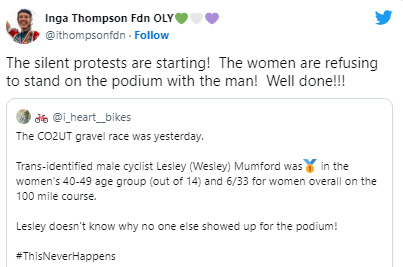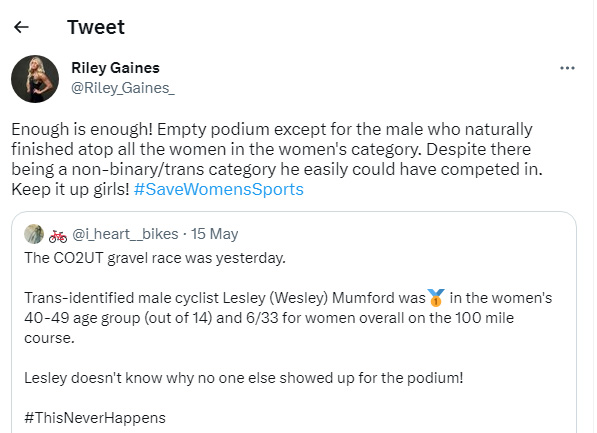In a recent gravel race, a transgender cyclist named Lesley Mumford made headlines after winning the female category. However, her victory was met with backlash when she took to social media to comment on other competitors bailing before the medal celebration.
This incident has reignited the ongoing debate surrounding transgender athletes participating in gender-specific sports.
Lesley Mumford, a 46-year-old cyclist who transitioned in 2017 while serving as a Colorado SWAT team leader, achieved success in the female category of the Desert Gravel Co2Ut race.
After winning her age group, she shared a triumphant photo on social media, expressing confusion about the number of participants who left before the podium ceremony. Mumford clarified that she was not the sole competitor in her age group, highlighting the 43 female cyclists who finished after her in the 40-49 category.
However, her post stirred controversy and triggered a wave of criticism.
Various individuals, including notable athletes and commentators, voiced their disapproval of Mumford’s win.
Inga Thompson, a three-time Olympian and cycling champion, tweeted about the perceived “silent protest” occurring on the podium. Thompson commended those who refused to stand alongside Mumford, asserting that women’s sports should not include transgender women.
Swimmer Riley Gaines, known for her critique of trans athletes, joined the discussion, expressing support for the so-called “silent protests” and employing the hashtag #SaveWomensSports.
The controversy surrounding Mumford’s victory gained significant media attention. Megyn Kelly, a prominent media personality, highlighted the story on her show, emphasizing the growing frequency of trans individuals winning women’s cycling events.
Kelly compared the situation to the contentious issue of trans women competing in swimming. She questioned the legitimacy of Mumford’s win, refusing to use Mumford’s preferred female pronouns and suggesting that Mumford had “stolen” the medals from cisgender women. These remarks further fueled the public discourse on transgender inclusion in sports.
Britt Mayer, an activist and co-founder of The Battle Cry, a group advocating against trans athletes in women’s sports, argued that women needed to assert themselves and challenge the current state of affairs. Mayer contended that being polite and silent would not resolve the issue, urging women to become stronger in their convictions.
Mayer’s sentiments were echoed by her fellow Battle Cry co-founder, Carrie Prejean Boller, who celebrated the rising courage among women standing up for their rights in sports.
Prior to her transition, Mumford served as a law enforcement officer for 17 years. Her decision to undergo transition garnered support from her then-wife, as well as Sheriff Jaime FitzSimons.
While Mumford did not initially seek to become a trailblazer or role model, she expressed her willingness to help others by sharing her story.




